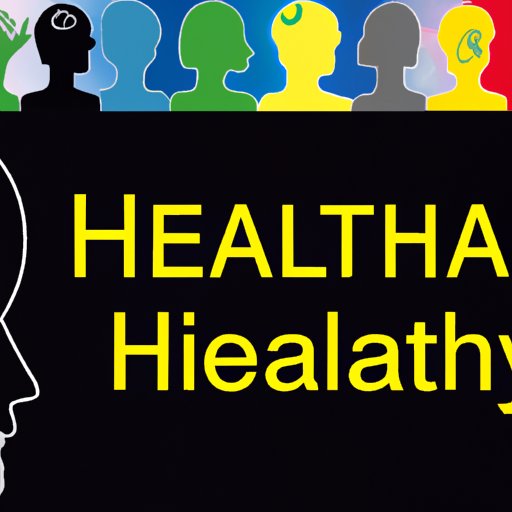An Overview of Mental Health Issues
Mental health is an important part of overall wellbeing. It affects how we think, feel, and act. Mental health issues, such as anxiety and depression, can have a significant impact on our daily lives and how we interact with others. Understanding the causes and types of mental health issues, as well as the available treatments, is essential to ensuring that individuals receive the help they need.
Definition of Mental Health
The World Health Organization (WHO) defines mental health as “a state of well-being in which every individual realizes his or her own potential, can cope with the normal stresses of life, can work productively and fruitfully, and is able to make a contribution to her or his community” (“Mental Health: A State of Well-Being”). This definition emphasizes the importance of mental health for all individuals, regardless of age, gender, or background.

Prevalence of Mental Health Issues in Society
Mental health issues are common in society today. According to the National Alliance on Mental Illness (NAMI), one in five adults in the United States experiences a mental illness in a given year. Additionally, one in 25 adults in the U.S. experiences a serious mental illness, such as bipolar disorder or schizophrenia, that significantly interferes with their daily lives (“Mental Illness Facts and Statistics”). Mental health issues can affect anyone, regardless of age, gender, or background.
Causes and Risk Factors of Mental Health Issues
Mental health issues can be caused by a variety of biological, psychological, and social factors. Biological factors, such as genetics and chemical imbalances in the brain, can play a role in the development of mental health issues. Psychological factors, such as stress, trauma, and low self-esteem, can also contribute to mental health problems. Social factors, such as poverty, family dynamics, and discrimination, can also increase the risk of developing mental health issues (“What Causes Mental Health Problems?”).

Types of Mental Health Disorders
Mental health disorders can be divided into several categories. Anxiety disorders, such as obsessive-compulsive disorder and post-traumatic stress disorder, involve persistent fear, worry, and avoidance of certain situations. Mood disorders, such as major depressive disorder and bipolar disorder, involve changes in mood that interfere with daily functioning. Eating disorders, such as anorexia nervosa and binge eating disorder, involve unhealthy eating habits and distorted body image. Impulse control disorders, such as kleptomania and pyromania, involve an inability to resist urges. Substance use disorders, such as alcohol and drug abuse, involve excessive use of substances that impair daily functioning. Personality disorders, such as borderline personality disorder and narcissistic personality disorder, involve long-term patterns of behavior that cause distress. Finally, trauma-related disorders, such as acute stress disorder and post-traumatic stress disorder, involve reactions to traumatic events.
Signs and Symptoms of Mental Health Issues
Individuals who are experiencing mental health issues may exhibit changes in behavior, mood, and thinking. Behavioral signs include restlessness, aggression, substance abuse, and withdrawal from activities. Mood signs include sadness, irritability, and apathy. Thinking signs include difficulty concentrating, racing thoughts, and negative self-talk. If these signs are present for an extended period of time, it is important to seek professional help.

Diagnosis and Treatment of Mental Health Issues
Mental health issues are diagnosed based on specific criteria outlined in the Diagnostic and Statistical Manual of Mental Disorders (DSM). Once the diagnosis has been made, treatment options can vary depending on the type and severity of the mental health issue. Treatment options can include counseling, medication, support groups, and self-care. It is important to find the right combination of treatments for each individual, as this will maximize the chances of a successful recovery.
Coping Strategies for Mental Health Issues
In addition to professional treatment, there are several coping strategies that can help individuals manage their mental health issues. Counseling can provide individuals with the tools they need to manage their mental health. Support groups can provide a safe and supportive environment in which individuals can share their experiences. Self-care, such as exercise, healthy eating, and getting enough sleep, can also help individuals manage their mental health issues.

The Impact of Mental Health Issues on Society
Mental health issues can have a significant impact on society. Stigma surrounding mental health issues can prevent individuals from seeking the help they need. The economic impact of mental health issues can be significant, due to lost productivity, medical costs, and other associated costs. Additionally, access to care can be a challenge for some individuals due to lack of insurance coverage or availability of mental health services in their area (“The Impact of Mental Illness on Society”).
(Note: Is this article not meeting your expectations? Do you have knowledge or insights to share? Unlock new opportunities and expand your reach by joining our authors team. Click Registration to join us and share your expertise with our readers.)
